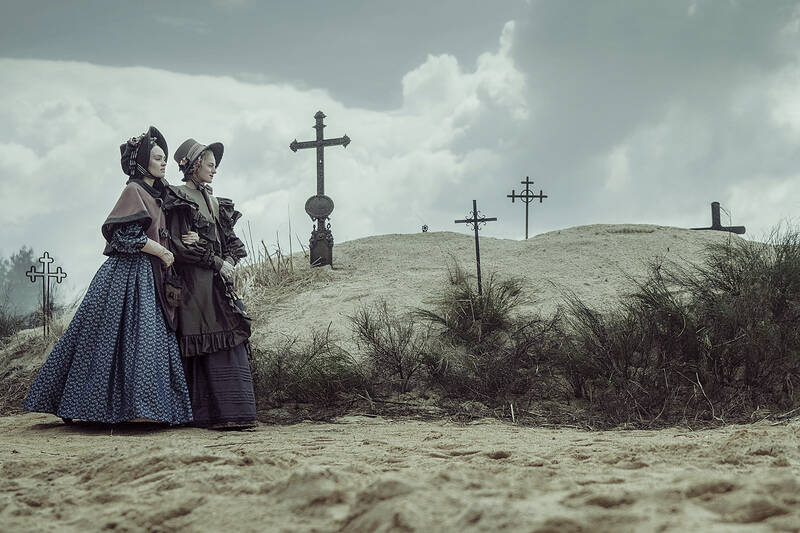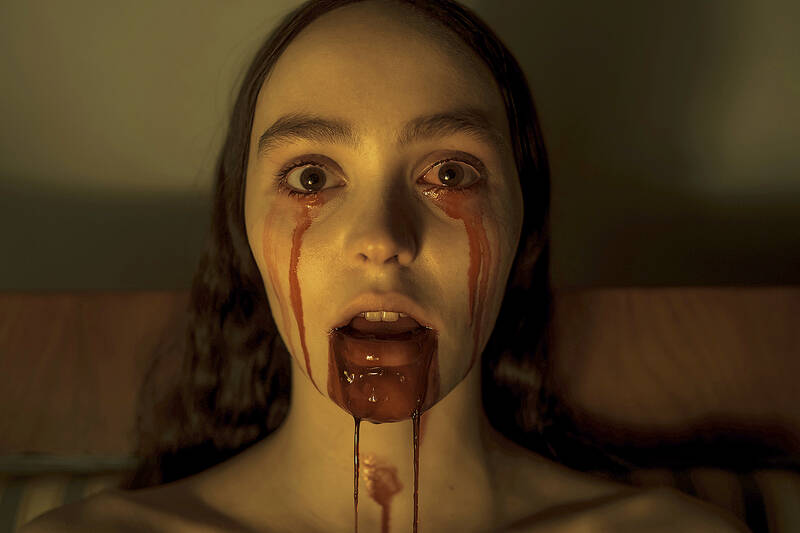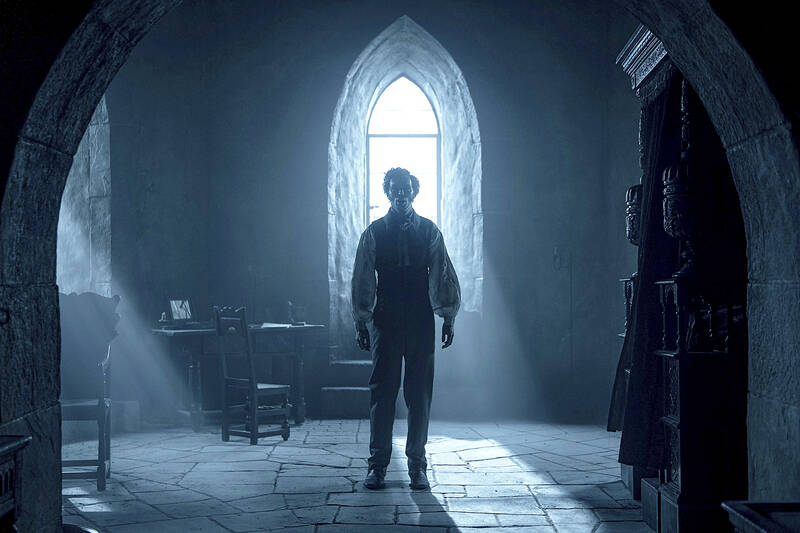Oh, the weather outside is frightful. But don’t head to the multiplex to stay warm. Not if you’re seeing Nosferatu, anyway. Bring your hand warmers, toe warmers, heart warmers and soul warmers — this update of the 1922 silent vampire classic will chill you to the bone.
But the film, in Taiwan theaters on Feb. 22, may not terrify you. Everything in Robert Eggers’ faithful, even adoring remake, from his picturesque 19th century German town to those bleak mountain snowscapes leading to that (brrr) imposing castle in Transylvania, looks great. But with its stylized, often stilted dialogue and overly dramatic storytelling, it feels more like everyone is living in a quaint period painting rather than a world populated by real humans (and, well, vampires) made of flesh and, er, blood.
Eggers, who writes and directs here, has described being haunted since youth with F.W. Murnau’s 1922 Nosferatu, starring Max Schreck (which borrowed so much from Bram Stoker’s 1897 novel Dracula that the author’s estate sued for copyright infringement). Eggers has said he wanted to present a true vampire, meaning the original folk variety — the horrifying, ugly, venal sort. Not the seduce-you-in-a-dinner-jacket kind.

Photo: AP
And certainly not the “veggie vampire” who drinks only animal blood (think Twilight). No, Eggers’ vampire, Count Orlok, wants only human blood — preferably from a lovely damsel.
The damsel here would be young wife Ellen (Lily-Rose Depp), the focus of Orlok’s obsessive desires. In a nod to changing times, Eggers brings the character to the forefront and suggests that in 19th century society, she was unfairly seen as “hysterical” when actually, she was, you know, possessed. The lovely Depp fully commits to the high drama — but we don’t learn much about what’s in her head. Like everything here, it’s a stylized performance that feels like a piece of art but keeps us at a distance.
After a prologue in which Ellen’s spiritual connection to Orlok is established, we begin our story in fictional Wisborg, on the Baltic coast. Ellen has just been married to handsome, fresh-faced Thomas Hutter (Nicholas Hoult, giving his all), who aims to gain employment with a real estate firm.

Photo: AP
But first, Thomas is told by the shady-looking boss, he must undertake an out-of-town assignment, traveling into the Carpathian mountains to obtain the signature of a shadowy client on the deed for a local fixer-upper. And he sets off, to the protestations of Ellen, who has been having some truly terrible dreams.
Note to self: When accepting job assignments, maybe think twice if your boss is sending you, solo, deep into wintry Transylvania? But if Thomas had used his noggin and sat home by the fire with his bride, we would have no movie.
Waiting for Thomas in the dark, lonely castle — the exteriors of which were actually filmed in Transylvania — is Orlok himself (Bill Skarsgard, truly unrecognizable in heavy, ugly makeup). They get down to business, but Thomas unfortunately cuts his finger, and his blood awakens a thirst in Orlok. Thomas soon realizes he’s in a very bad place and needs to get back to his wife forthwith.

Photo: AP
Back in Wisborg, Ellen is staying with the couple’s friends, the Hardings (Aaron Taylor-Johnson and Emma Corrin, not given much to work with), and suffering from seizures and spells. Orlok is calling to her, staking his claim. The friends are trying to help, and when traditional medicine fails they turn to a specialist in the occult — and a gift to the rest of us, because he’s played by Willem Dafoe.
Dafoe’s naturally witty presence gives us a sense of relief from the stylized dialogue as the movie travels to its inevitable conclusion, and surely what true horror fans are waiting for: Orlok’s climactic confrontation with Ellen.
For such fans, the frightening tableau of a skeletal Orlok lying atop a drained Ellen will be satisfying enough to make the experience worthwhile. The rest of us might leave with the same feeling we had in the beginning: a deep but distant chill.

Photo: AP

June 9 to June 15 A photo of two men riding trendy high-wheel Penny-Farthing bicycles past a Qing Dynasty gate aptly captures the essence of Taipei in 1897 — a newly colonized city on the cusp of great change. The Japanese began making significant modifications to the cityscape in 1899, tearing down Qing-era structures, widening boulevards and installing Western-style infrastructure and buildings. The photographer, Minosuke Imamura, only spent a year in Taiwan as a cartographer for the governor-general’s office, but he left behind a treasure trove of 130 images showing life at the onset of Japanese rule, spanning July 1897 to

One of the most important gripes that Taiwanese have about the Democratic Progressive Party (DPP) is that it has failed to deliver concretely on higher wages, housing prices and other bread-and-butter issues. The parallel complaint is that the DPP cares only about glamor issues, such as removing markers of Chinese Nationalist Party (KMT) colonialism by renaming them, or what the KMT codes as “de-Sinification.” Once again, as a critical election looms, the DPP is presenting evidence for that charge. The KMT was quick to jump on the recent proposal of the Ministry of the Interior (MOI) to rename roads that symbolize

On the evening of June 1, Control Yuan Secretary-General Lee Chun-yi (李俊俋) apologized and resigned in disgrace. His crime was instructing his driver to use a Control Yuan vehicle to transport his dog to a pet grooming salon. The Control Yuan is the government branch that investigates, audits and impeaches government officials for, among other things, misuse of government funds, so his misuse of a government vehicle was highly inappropriate. If this story were told to anyone living in the golden era of swaggering gangsters, flashy nouveau riche businessmen, and corrupt “black gold” politics of the 1980s and 1990s, they would have laughed.

In an interview posted online by United Daily News (UDN) on May 26, current Chinese Nationalist Party (KMT) Chairman Eric Chu (朱立倫) was asked about Taichung Mayor Lu Shiow-yen (盧秀燕) replacing him as party chair. Though not yet officially running, by the customs of Taiwan politics, Lu has been signalling she is both running for party chair and to be the party’s 2028 presidential candidate. She told an international media outlet that she was considering a run. She also gave a speech in Keelung on national priorities and foreign affairs. For details, see the May 23 edition of this column,